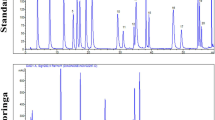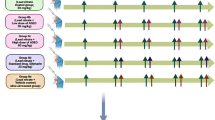Abstract
This experiment explored the potential hepatic protective effect of Moringa oleifera Lam. methanolic extract (MOE) against lead-induced hepatotoxicity. Thirty-two adult Wistar albino rats were allocated randomly equally into four groups, seven rats each. The control group received intraperitoneal (i.p.) injections of physiological saline (0.9% NaCl); the lead acetate (Pb) group was i.p. injected with 20 mg/kg of Pb; the MOE group was orally administered with 250 mg/kg of MOE; and the MOE+ Pb group was orally treated with 250 mg/kg of MOE 3 h before receiving i.p. injections of 20 mg/kg Pb. All rats received their treatment for 14 days. Results revealed that Pb(II) intoxication induced liver injury accompanied by elevated levels of liver function markers (ALT and AST), oxidative stress markers (MDA and NO), and proinflammatory cytokines (NF-κB p65, TNFα, and IL-1β as well iNOS expression) in addition to the pro-apoptotic-related proteins such as Bax and caspase-3. Meanwhile, significantly depleted GSH content, suppressed activity of antioxidant enzyme activity, and anti-apoptotic protein Bcl-2 were also manifested in the liver tissue. Interestingly, concurrent treatment of rats with MOE ameliorated liver markers, prevented tissue injury, and inhibited oxidative stress, apoptosis, and NF-κB. In addition, MOE activated the detoxifying enzyme system in Pb(II)-intoxicated rats. Therefore, the obtained results in the present experiment provide evidence that MOE concurrent administration has the potential to protect the liver tissues in Pb(II)-intoxicated rats by preventing oxidative stress, inflammation, and apoptosis, via attenuation of NF-κB signaling pathway.







Similar content being viewed by others
References
Abdel Moneim AE (2012) Flaxseed oil as a neuroprotective agent on lead acetate-induced monoamineric alterations and neurotoxicity in rats. Biol Trace Elem Res 148:363–370. https://doi.org/10.1007/s12011-012-9370-4
Abdel Moneim AE (2016) Indigofera oblongifolia prevents lead acetate-induced hepatotoxicity, oxidative stress, fibrosis and apoptosis in rats. PLoS One 11:e0158965. https://doi.org/10.1371/journal.pone.0158965
Abdel-Moneim AE, Dkhil MA, Al-Quraishy S (2011) The redox status in rats treated with flaxseed oil and lead-induced hepatotoxicity. Biol Trace Elem Res 143:457–467. https://doi.org/10.1007/s12011-010-8882-z
Aebi H (1984) Catalase in vitro. Methods Enzymol 105:121–126
Al Olayan EM, Aloufi AS, AlAmri OD, El-Habit OH, Abdel Moneim AE (2020) Protocatechuic acid mitigates cadmium-induced neurotoxicity in rats: role of oxidative stress, inflammation and apoptosis. Sci Total Environ. https://doi.org/10.1016/j.scitotenv.2020.137969
Al Omar SY, Fahad AA, Abdel Moneim AE, Metwally DM, El-Khadragy MF, Kassab RB (2019) The neuroprotective role of coenzyme Q10 against lead acetate-induced neurotoxicity is mediated by antioxidant, anti-inflammatory and anti-apoptotic activities. Int J Environ Res Public Health 16. https://doi.org/10.3390/ijerph16162895
Aladaileh SH et al (2020) Spirulina platensis ameliorates the sub chronic toxicities of lead in rabbits via anti-oxidative, anti-inflammatory, and immune stimulatory properties. Sci Total Environ 701:134879. https://doi.org/10.1016/j.scitotenv.2019.134879
Al-Megrin WA et al (2020) Antagonistic efficacy of luteolin against lead acetate exposure-associated with hepatotoxicity is mediated via antioxidant, anti-inflammatory, and anti-apoptotic activities. Antioxidants 9:10. https://doi.org/10.3390/antiox9010010
Al-Quraishy S, Dkhil MA, Ibrahim SR, Abdel Moneim AE (2016) Neuroprotective potential of Indigofera oblongifolia leaf methanolic extract against lead acetate-induced neurotoxicity. Neural Regen Res 11:1797–1803. https://doi.org/10.4103/1673-5374.194749
Asgari-Kafrani A, Fazilati M, Nazem H (2019) Hepatoprotective and antioxidant activity of aerial parts of Moringa oleifera in prevention of non-alcoholic fatty liver disease in Wistar rats. South Afr J Botany. https://doi.org/10.1016/j.sajb.2019.01.014
Chen C, Lin B, Qi S, He J, Zheng H (2019) Protective effects of salidroside on lead acetate-induced oxidative stress and hepatotoxicity in Sprague-Dawley rats. Biol Trace Elem Res 191:426–434. https://doi.org/10.1007/s12011-019-1635-8
De Vega L, Fernandez RP, Mateo MC, Bustamante JB, Herrero AM, Munguira EB (2002) Glutathione determination and a study of the activity of glutathione-peroxidase, glutathione-transferase, and glutathione-reductase in renal transplants. Ren Fail 24:421–432
El-Khadragy M et al (2018) Clinical efficacy associated with enhanced antioxidant enzyme activities of silver nanoparticles biosynthesized using Moringa oleifera leaf extract, against cutaneous leishmaniasis in a murine model of Leishmania major. Int J Environ Res Public Health 15. https://doi.org/10.3390/ijerph15051037
Ellman GL, Courtney KD, Andres V Jr, Feather-Stone RM (1961) A new and rapid colorimetric determination of acetylcholinesterase activity. Biochem Pharmacol 7:88–95
Falowo AB, Mukumbo FE, Idamokoro EM, Lorenzo JM, Afolayan AJ, Muchenje V (2018) Multi-functional application of Moringa oleifera Lam. in nutrition and animal food products: a review. Food Res Int 106:317–334. https://doi.org/10.1016/j.foodres.2017.12.079
Flora G, Gupta D, Tiwari A (2012) Toxicity of lead: a review with recent updates. Interdiscip Toxicol 5:47–58. https://doi.org/10.2478/v10102-012-0009-2
Gopalakrishnan L, Doriya K, Kumar DS (2016) Moringa oleifera: a review on nutritive importance and its medicinal application. Food Sci Human Wellness 5:49–56. https://doi.org/10.1016/j.fshw.2016.04.001
Green LC, Wagner DA, Glogowski J, Skipper PL, Wishnok JS, Tannenbaum SR (1982) Analysis of nitrate, nitrite, and [15N]nitrate in biological fluids. Anal Biochem 126:131–138
Kandeil MA, Mohammed ET, Hashem KS, Aleya L, Abdel-Daim MM (2019) Moringa seed extract alleviates titanium oxide nanoparticles (TiO2-NPs)-induced cerebral oxidative damage, and increases cerebral mitochondrial viability. Environ Sci Pollut Res Int. https://doi.org/10.1007/s11356-019-05514-2
Khalil SR, Khalifa HA, Abdel-Motal SM, Mohammed HH, Elewa YHA, Mahmoud HA (2018) Spirulina platensis attenuates the associated neurobehavioral and inflammatory response impairments in rats exposed to lead acetate. Ecotoxicol Environ Saf 157:255–265. https://doi.org/10.1016/j.ecoenv.2018.03.068
Khalil SR, Mohammed WA, Zaglool AW, Elhady WM, Farag MR, El Sayed SAM (2019) Inflammatory and oxidative injury is induced in cardiac and pulmonary tissue following fipronil exposure in Japanese quail: mRNA expression of the genes encoding interleukin 6, nuclear factor kappa B, and tumor necrosis factor-alpha. Environ Pollut 251:564–572. https://doi.org/10.1016/j.envpol.2019.05.012
Khalil SR, Abdel-Motal SM, Abd-Elsalam M, Abd El-Hameed NE, Awad A (2020) Restoring strategy of ethanolic extract of Moringa oleifera leaves against tilmicosin-induced cardiac injury in rats: targeting cell apoptosis-mediated pathways. Gene 730:144272. https://doi.org/10.1016/j.gene.2019.144272
Kumar S, Pandey AK (2013) Chemistry and biological activities of flavonoids: an overview. Sci World J 2013:162750. https://doi.org/10.1155/2013/162750
Kumari A, Jalaja D (2010) Hypoglycaemic effect of Moringa oleifera and Azadirachta indica in type 2 diabetes mellitus. Bioscan 5:211–214
Kurutas EB (2016) The importance of antioxidants which play the role in cellular response against oxidative/nitrosative stress: current state. Nutr J 15:71. https://doi.org/10.1186/s12937-016-0186-5
Livak KJ, Schmittgen TD (2001) Analysis of relative gene expression data using real-time quantitative PCR and the 2(-Delta Delta C(T)) Method. Methods 25:402–408. https://doi.org/10.1006/meth.2001.1262
Lowry OH, Rosebrough NJ, Farr AL, Randall RJ (1951) Protein measurement with the Folin phenol reagent. J Biol Chem 193:265–275
Mason LH, Harp JP, Han DY (2014) Pb neurotoxicity: neuropsychological effects of lead toxicity. Biomed Res Int 2014:840547. https://doi.org/10.1155/2014/840547
Minaiyan M, Asghari G, Taheri D, Saeidi M, Nasr-Esfahani S (2014) Anti-inflammatory effect of Moringa oleifera Lam. seeds on acetic acid-induced acute colitis in rats. Avicenna J Phytomed 4:127–136
Mohamed AA, Metwally MMM, Khalil SR, Salem GA, Ali HA (2019) Moringa oleifera extract attenuates the CoCl2 induced hypoxia of rat's brain: expression pattern of HIF-1alpha, NF-kB, MAO and EPO. Biomed Pharmacother 109:1688–1697. https://doi.org/10.1016/j.biopha.2018.11.019
Nishikimi M, Appaji N, Yagi K (1972) The occurrence of superoxide anion in the reaction of reduced phenazine methosulfate and molecular oxygen. Biochem Biophys Res Commun 46:849–854
Obeng-Gyasi E, Armijos RX, Weigel MM, Filippelli GM, Sayegh MA (2018) Cardiovascular-related outcomes in U.S. adults exposed to lead. Int J Environ Res Public Health 15. https://doi.org/10.3390/ijerph15040759
Oguntibeju OO, Aboua GY, Omodanisi EI (2019) Effects of Moringa oleifera on oxidative stress, apoptotic and inflammatory biomarkers in streptozotocin-induced diabetic animal model. South Afr J Botany. https://doi.org/10.1016/j.sajb.2019.08.039
Ohkawa H, Ohishi N, Yagi K (1979) Assay for lipid peroxides in animal tissues by thiobarbituric acid reaction. Anal Biochem 95:351–358
Paglia DE, Valentine WN (1967) Studies on the quantitative and qualitative characterization of erythrocyte glutathione peroxidase. J Lab Clin Med 70:158–169
Qi S, Zheng H, Chen C, Jiang H (2019) Du-Zhong (Eucommia ulmoides Oliv) cortex extract alleviates lead acetate-induced bone loss in rats. Biol Trace Elem Res 187:172–180. https://doi.org/10.1007/s12011-018-1362-6
Radi R (2013) Peroxynitrite, a stealthy biological oxidant. J Biol Chem 288:26464–26472. https://doi.org/10.1074/jbc.R113.472936
Sharifi AM, Mousavi SH, Jorjani M (2010) Effect of chronic lead exposure on pro-apoptotic Bax and anti-apoptotic Bcl-2 protein expression in rat hippocampus in vivo. Cell Mol Neurobiol 30:769–774. https://doi.org/10.1007/s10571-010-9504-1
Szkoda J, Zmudzki J (2005) Determination of lead and cadmium in biological material by graphite furnace atomic absorption spectrometry method. Bull Vet Inst Pulawy 49:89–92
William F, Lakshminarayanan S, Chegu H (1993) Effect of some Indian vegetables on the glucose and insulin response in diabetic subjects. Int J Food Sci Nutr 44:191–195. https://doi.org/10.3109/09637489309017439
Acknowledgments
The authors extend their appreciation to King Saud University for funding and supporting this work through research group number 2019/95.
Author information
Authors and Affiliations
Corresponding author
Ethics declarations
Conflict of interest
The authors declare that they have no conflict of interest.
Additional information
Responsible editor: Mohamed M. Abdel-Daim
Publisher’s note
Springer Nature remains neutral with regard to jurisdictional claims in published maps and institutional affiliations.
Electronic supplementary material
Fig. 1
Effects of Moringa oleifera Lam. extract (MOE) on body weight of rats treated with lead acetate (Pb) for 14 days. Values are means ± SDs (n = 8). a p < 0.05, significantly different to the control rat. (JPG 357 kb)
Rights and permissions
About this article
Cite this article
Albasher, G., Al Kahtani, S., Alwahibi, M.S. et al. Effect of Moringa oleifera Lam. methanolic extract on lead-induced oxidative stress-mediated hepatic damage and inflammation in rats. Environ Sci Pollut Res 27, 19877–19887 (2020). https://doi.org/10.1007/s11356-020-08525-6
Received:
Accepted:
Published:
Issue Date:
DOI: https://doi.org/10.1007/s11356-020-08525-6




